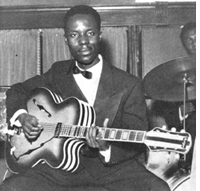|
 African Fiesta Sukisa, influential Congolese rumba band, formed 1966; disbanded 1973. Notable early members: Pierre "De La France" Bazetta (born Kinshasa, Nov. 11, 1936; guitar), Dominique "Apôtre" Dionga (born Kinshasa, Feb. 3, 1942; vocal), Docteur Nico Kasanda (born Mikalayi, Congo-Kinshasa, July 7, 1939; died Brussels, Sept. 22, 1985; guitar), André "Zorro" Lumingu (born Matadi, Congo-Kinshasa, Oct. 19, 1941; bass), Joseph "Jeef" Mingiedi (born Makela, Angola, Feb. 25, 1932; trumpet), Paul Mizele (born Kinshasa, May 15, 1942; vocal), Charles "Dechaud" Mwamba (born Kananga, Congo-Kinshasa, 1934 or 1935; died Kinshasa, Sept. 4, 1999; guitar). African Fiesta Sukisa, influential Congolese rumba band, formed 1966; disbanded 1973. Notable early members: Pierre "De La France" Bazetta (born Kinshasa, Nov. 11, 1936; guitar), Dominique "Apôtre" Dionga (born Kinshasa, Feb. 3, 1942; vocal), Docteur Nico Kasanda (born Mikalayi, Congo-Kinshasa, July 7, 1939; died Brussels, Sept. 22, 1985; guitar), André "Zorro" Lumingu (born Matadi, Congo-Kinshasa, Oct. 19, 1941; bass), Joseph "Jeef" Mingiedi (born Makela, Angola, Feb. 25, 1932; trumpet), Paul Mizele (born Kinshasa, May 15, 1942; vocal), Charles "Dechaud" Mwamba (born Kananga, Congo-Kinshasa, 1934 or 1935; died Kinshasa, Sept. 4, 1999; guitar).
Band formed as a result of a split within African Fiesta, which had started three years earlier when musicians of the illustrious African Jazz abandoned their leader, Joseph Kabasele. Docteur Nico and singers Pascal "Rochereau" Tabou (later Tabu Ley) and Roger Izeidi had been co-leaders of African Fiesta, but when tensions arose, the faction led by Rochereau and Izeidi became African Fiesta 66 (later Afrisa) while Nico's faction became African Fiesta Sukisa.
Nico had always chafed under the leadership of others; Fiesta Sukisa would be his own creative vehicle. With Nico on lead guitar (called solo in Congo) joined by his brother Dechaud on rhythm guitar (accompaniment) and by Bazetta playing between lead and rhythm (mi-solo), the band possessed a solid foundation. But Nico's leadership skills fell short of his musical prowess, so the band fashioned its works with a constantly changing supporting cast. Notable musicians who served at Nico's side included singers Lessa Lassan, Etienne "Chantal" Kazadi, Josky Kiambukuta, and Valentin Sangana along with Bopol Mansiamina and William "Serpent" Kabamba, both of whom could double on guitar and bass.
Nico composed much of the group's material including hits like "Aruna," about a girl from Tanzania, and "Bougie ya Motema" (light of my heart). Others contributed to the hit parade as well: Lassan's "Echantillon ya Pamba" (useless example) and flutist Michel Ngwalali's "Limbisa Ngai" (forgive me), with Nico on Hawaiian steel guitar. Most songs stayed faithful to the standard Congolese rumba, but Nico loved to experiment. "Suavilo" features Ngwalali in a lovely Cuban guajira and "Marie Pauline" echoes the likembe (thumb piano) of traditional music.
The late sixties were Fiesta Sukisa's best years. Songs released as 45 RPM singles sold from coast to coast, and the group toured extensively outside Congo, creating waves of imitators in its wake. Multiple defections in 1969, 1971, and 1972 weakened the group to the point that it finally fell apart. Attempts to restart it failed, largely because of Nico's mounting personal problems.
African Fiesta Sukisa enjoyed its continent-wide following mainly because of Nico's exceptional guitar playing. Nico and Dechaud defined what it meant to be lead and rhythm players in a Congolese band. Guitarists at home and abroad tried to emulate their style. Despite the band's demise and subsequent deaths of the brothers, African Fiesta Sukisa left a still-audible mark on Africa's popular music.
© 2011 Gary Stewart
SELECT DISCOGRAPHY
Eternel Docteur Nico (Sonodisc CD36516) sixties recordings reissued 1992; Nico et L'African Fiesta Sukisa (Sonodisc CD36524) sixties recordings reissued 1992; Nico & L'African Fiesta Sukisa (Sonodisc CD36548) sixties and seventies recordings reissued 1995; Tu m'as deçu, chouchou (Sonodisc CD36558) sixties recordings reissued 1996; Asala Malekoum (Sonodisc CD36589) sixties recordings reissued 1998.
SELECT BIBLIOGRAPHY
M. Lonoh, Essai de commentaire sur la musique congolaise moderne, (Kinshasa, 1969); S. Bemba, 50 ans de musique du Congo-Zaire (Paris, 1984); G. Stewart, Rumba on the River (London and New York, 2000).
|

